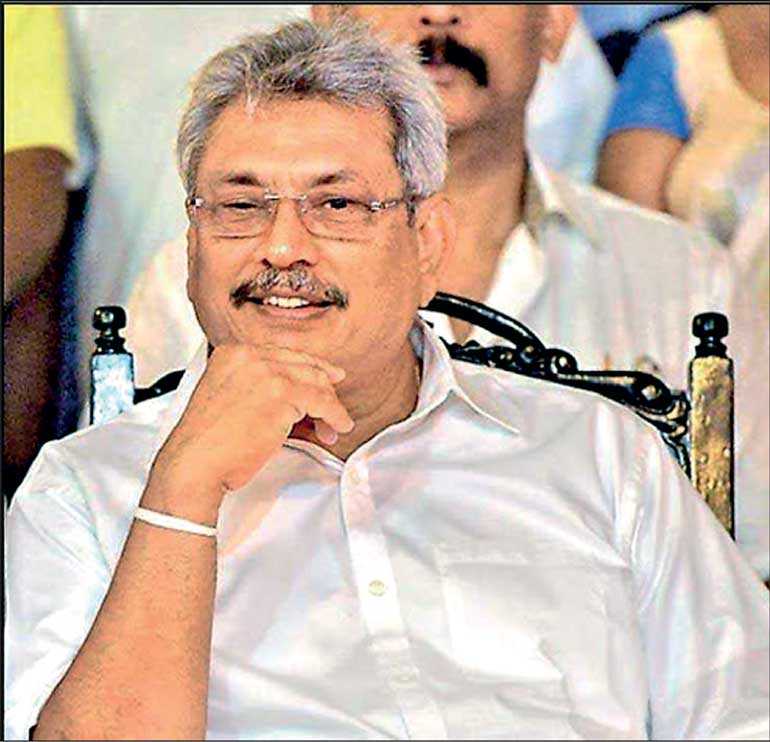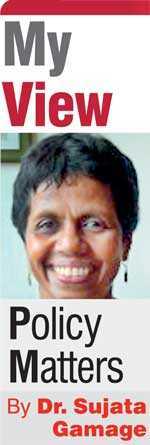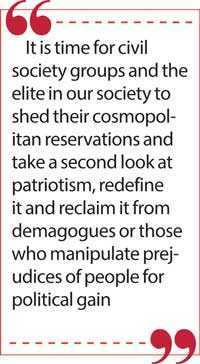Monday Feb 23, 2026
Monday Feb 23, 2026
Friday, 16 April 2021 00:00 - - {{hitsCtrl.values.hits}}

The honeymoon period for the presidency is well over
 The honeymoon period for the presidency is well over. Whispers of ‘Sir fail’ have become a chorus on social media. The failure of a presidency is not just about the person. It is about failure of the drivers of Government.
The honeymoon period for the presidency is well over. Whispers of ‘Sir fail’ have become a chorus on social media. The failure of a presidency is not just about the person. It is about failure of the drivers of Government.
The President, the Legislature and the Judiciary trio may be the components of Government, but the drivers of Government get things done. The drivers, as I see them, are (1) an overarching vision or an ideology (2) policies that articulate the vision and (3) a functioning system of governance to implement.
If the Yahapalana Government was dysfunctional and there was chaos in policies, at least the ideology was not toxic. Yahapalana ideology may have divided people for or against liberalism, but it did divide people over race and religion. The present Government is failing in all three aspects – ideology, policies, implementation – too much, too soon.
There are promises but no policies to take them fruition, capacity of bureaucracy is diminished further, and the ideology based on racism and anti-scientism is backfiring. The economy is tanking, international pressures are mounting. Will this Government come to its senses and rein-in itself, or take us all down a precipice?
On the eve of this Sinhala and Tamil New year, I see a path, not a solution. It is about surviving the present and readying for a better tomorrow. The Opposition may be lethargic, and the media stuck in partisan holes into which they had dug themselves, but civil society forces are gathering momentum.
Sadharana Samajayak or the National Movement for Social Justice, the movement led by late Sobitha Thera, has been resurrected. Centenary Movement Sri Lanka (or 100.lk) was launched recently. The former represent an older generation and plays a watchdog role, and the latter is a youth group playing a long-term leadership building role.
There are many initiatives in-between, some with more political leanings. Overall, there is a sense that we need to look within ourselves, and essentially ‘elect ourselves a new people’ as Bertolt Brecht famously remarked. I see three priorities for any civil society group.
Fill the policy vacuum
The President said recently, “My word is enough, no need for circulars.” A look at the discussions at the first few ‘conversations with a village’ programs of the President shows problems this approach can cause.
A recurrent issue at these meetings is farmers wanting access to protected land, and the president instructing wildlife and forest conservation officials not to obstruct. Have they been obstructing or enforcing the law? How can they change their behaviour unless they get regulations changed to open protected areas to farmers? Are these real farmers or political hacks wanting to make a quick buck?
If real entrepreneurs need land for their new ventures, the President has all the tools at his desk because he is the Head of the Executive and he can call all relevant agencies together at any time and ask them to come up with solutions. Is it a matter of making farming more efficient, if so, what should be done? These are questions to be sorted at policy level not at field operations.
As a blogger commented recently, the President has little experience at the ground level. If he desires to get that experience, well and good, but he cannot and should not create policy chaos.
The chaos also provides opportunities for intervention by civil society in sectors such education, environment, and health where there is much civil society interest, and in issues related to economy where there several think tanks taking up the challenge of providing policy inputs.
 Insist on systems, sector by sector
Insist on systems, sector by sector
We have become wearied of an inefficient and corrupt bureaucracy, and mostly learned to accept them as a given. It should not be so. We have repeatedly seen that there is no single political saviour who can deliver. They can deliver only if institutions and systems of governance work.
Recently a member of the ruling coalition severely criticised the Minister for Education and the Secretary for being ineffective. He was right.
The education promises in the Gotabaya Manifesto are quite clear: (1) One preschool and one day care centre in each Grama Seva Niladhari division; (2) 1,000 National Schools, up from the present 353; (3) Education without stress or delay for students; (4) A university education for all who qualify; (5) Unskilled labour reduced to 10% by 2025. To date, after 16 months in power, the Ministry has not been able to show signs of progress in any of those five.
The problem is not the two individual leaders per se, but a fundamental flaw in the thinking at the centre that it can and should do everything.
Take the 1,000 National Schools idea, for example. It is the nth reincarnation of an idea that started with the original 52 Central Schools. As the central schools started to lose their edge due to underfunding and other reasons, they were replaced, unplanned by any authority, by ‘popular schools’ clustered around major cities. These schools are popular because alumni and parents in those schools have been able to compensate for underfunding by the Government. While these schools provide relief to some parents, they are a testimony to the failure of free education to address inequities in access to education.
Every succeeding government has made efforts to correct for these inequities with the support of the World Bank and or Asian Development Bank, but the efforts have failed. Navodya project (1997), Isuru project (2007), Thousand Mahindodaya Schools project (2012) and lastly the Nearest School is Best School project (2015-2019) are examples.
As the Ministry of Education embarks on another initiative, we need to ask why these earlier ones failed. I have two hypotheses. (1) Centralisation of management ignoring the principle of subsidiarity and (2) Politicisation and use of the school system primarily as a place for employment for party faithful.
In the public school system in Sri Lanka, we have 246,000+ teachers, of whom 49% are trained and another 48% are graduates, but there is a severe shortage of teachers in science, Math, English, etc., and schools in remote areas have trouble filling vacancies. It is a continuing problem with no solution in sight under the present system where central ministry or provincial ministries recruit and deploy teachers.
This is the wrong approach according to the principle of subsidiary which states that issues are best handled by the authority closest to the issue. Education Forum Sri Lanka is exploring how teacher recruitment can be decentralised to school level by allowing principles to recruit teachers from across the country.
Even if schools are given the freedom, the composition of the existing cadre of teachers could pose a problem. Politicisation of education has led to the placement of unemployed graduates into the school system, without a consideration of the needs of the system.
If parents and other stakeholders in a school system has more of a say in teacher recruitment, the politicisation could be reduced to some extent in the future, but the current body of recruits whose skills do not match the requirements of the system for more Math, science, and English teachers, for example, is a serious problem which requires careful study.
Currently 95% or more of the budget allocation targeted for school is needed to cover teacher salaries. Recruiting new teachers would reduce the amounts available for teacher development or student development through co-curricular or extra-curricular activities. Rationalising the teacher service is perhaps the most critical governance issue in the education sector.
Reclaim patriotism
The expression that ‘patriotism is the last resort of the scoundrel’ attributed to Samuel Johnson apparently does not reflect the importance he attributed to patriotism in public life. In fact, he argues that true patriotism is an essential attribute for elected representatives in his address to Electors in 1774 titled ‘Patriots’:
“To select and depute those, by whom laws are to be made, and taxes to be granted, is a high dignity, and an important trust; and it is the business of every elector to consider, how this dignity may be faithfully discharged. It ought to be deeply impressed on the minds of all who have voices in this national deliberation, that no man can deserve a seat in parliament, who is not a patriot. No other man will protect our rights: no other man can merit our confidence.”
He goes on to define a patriot and suffice to say it is opposite of the patriotism of our self-proclaimed patriots who have equated patriotism with racism and anti-scientism.
Patriotism has been used in most abominable ways in the recent election. It is worth putting on record the sequence of events in the run up to the Presidential Election in November 2019. To list: Fabrications about Muslim traders adding sterilising pills to food (4 March 2018, Ampara), fabrication of a plot to assassinate the President, paving the way for a rift in the Government (12 September 2018); a coup to take power with persons who should know better making a legal case for it (October 2018).
Soon after the Easter bombing by Muslim extremists (21 April 2019), the media supporting the Opposition goes on a frenzy accusing a Muslim doctor of sterilising pregnant mothers, (May 2019). To top it all, a man dived into the Kelani river and brought a casket containing relics purportedly from a nether world of ‘Nagas’ and ordinary people line up to pay homage, and the priest declared that we are about to see the ascension of a great leader (12 November 2019). Then comes the Presidential Election (16 November 2019) and Gotabaya Rajapaksa wins it handsomely.
After the election, 2020, the year of COVID-19, could have been a year to bring people together against the common enemy. Yet the present regime had to scapegoat the Muslims to cover for its deficiencies. The burial issue which could have been easily sorted using guidelines even stricter than international guidelines was made into a circus to torment the Muslims and presumably showcase the Government’s tough stand against minority demands. Ant-scientism part of the false patriotism came to a head when Instead of focusing on testing and vaccinations, publicity was given charlatans peddling ‘paniyas’ or elixirs.
It is time for civil society groups and the elite in our society to shed their cosmopolitan reservations and take a second look at patriotism, redefine it and reclaim it from demagogues or those who manipulate prejudices of people for political gain.